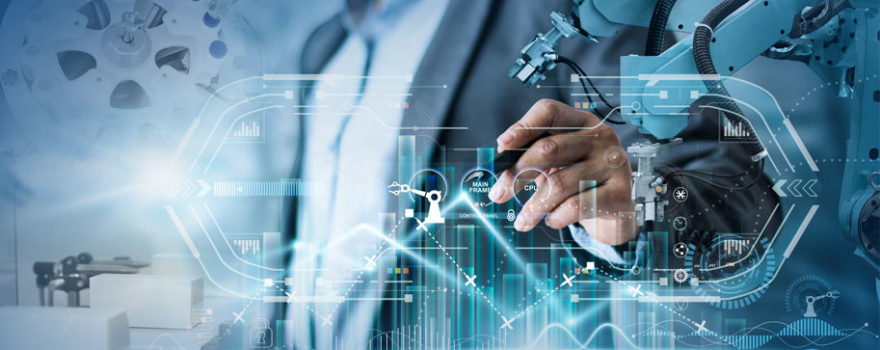
The evolution of industrial automation processes, with the introduction of digitalisation systems and the transition to Industry 4.0, is slowly redefining our economy, with a positive impact in terms of efficiency and sustainability. A recent survey carried out by ANIE Automazione, a company representing automation technology suppliers in Italy, shows that the first quarter of 2022 ended positively for 94% of companies in the sector.
The transformation is particularly evident in areas such as nutraceuticals and the pharmaceutical industry, a leading sector of the Italian economy, where the combination of research and innovation is an essential requirement to ensure the health of consumers. The use of ‘intelligent machines’ minimises the risk of human error and ensures constant control over the production chain; it makes it possible to optimise processes, eliminate waste and use resources more efficiently. This allows a better quality of the finished product and diversifies production to meet new market demands. The results of this transformation are not only environmental and economic, but also reflect on the safety of workers and the quality of work in the company.
A brief history of automation
The term ‘automation’, which combines the words automatic and production, first appeared in 1952. The paternity of the term is disputed between Del Harder, then vice-president of operations at Ford Motor Company, and US entrepreneur John Diebold, author of Automation: the advent of automatic factory.
In the early stages of industrial automation, human labour focused on the maintenance and supervision of machines capable of performing tasks of medium to high complexity. With the advent of digitalisation, devices capable of processing and transmitting large amounts of data at a speed that was once unthinkable were introduced. The transition to Industry 4.0 simplifies and accelerates production processes, making them more reliable, efficient, flexible and sustainable. This has a positive impact on energy savings, resource management and the customisation of products, the characteristics of which can be redefined according to demand flows. In addition to quality, the survey conducted by Federmeccanica in 2016 points out that product innovativeness, i.e. the ability to customise, differentiate and adapt products to new consumer demands, helps to make companies more competitive on the market.
The integrated factory model
The study Digitisation, automation and the future of work, published in 2017 by INAPP (National Institute for Public Policy Analysis), points out that product innovations “constitute changes capable of generating an increase in demand and income for the same number of production factors employed, thus creating the conditions for increases in employment and wages“.
If, on the one hand, automation renders certain tasks obsolete, on the other, it is an incentive for retraining, capable of generating new forms of employment and new professional profiles with specific skills able to adapt to technological progress. In this sense, it should not be understood as a simple shift of activities from man to machine, but as “a series of steps in the process towards integrated systems of processes, technology, organisation, roles and values with the aim of obtaining optimal products and services, organisations and social systems” (Butera, 2014). The failure of the unmanned factory model, centred on the exclusive use of robots and advanced mechanisation systems, in recent decades has given way to the concept of the integrated factory, in which a high concentration of automated systems corresponds to a significant percentage of human activities, with specialised figures able to ensure the programming and monitoring of machinery. “Machine operators thus become machine supervisors, with new skills, knowledge extended to the whole process and working environment” (Butera, 2014).
Job security and quality
According to the McKinsey Global Institute, automation of industrial activities could increase the annual growth rate of global productivity by between 0.8% and 1.4% in the near future. The benefits will not only be seen on a macroeconomic level, but also on a microeconomic level. Automation will not generate unemployment, but will allow companies to counteract the effects of an ageing workforce by increasing the productivity of high-skilled jobs, improving the quality of processes and reducing downtime in companies. The change will mainly affect manual jobs (particularly prevalent in the manufacturing industry) and data processing.
As well as simplifying activities, automation will ensure greater safety in the workplace, freeing employees from strenuous tasks and repetitive routines, which, according to INAIL, are responsible for many joint diseases, fatigue, reduced productivity and potentially risky situations, due to the state of alienation generated by prolonged activities. The Employer Brand Research, conducted by Randstad in 2021, analysed a sample of more than 190,000 people from 34 countries around the world to identify the attractiveness of more than 6,000 companies to potential workers. The five criteria that most influence people in their choice of workplace are:
- work-life balance;
- pleasant working atmosphere;
- pay and benefits;
- job security;
- career prospects.
In the Italian sample, the company climate was the determining factor.
Tecnomaco: innovative solutions for the nutraceutical and pharmaceutical industry
Tecnomaco designs tailor-made machines and entire packaging lines, capable of ensuring efficiency, quality, sustainability and constant control over the entire production chain:
- solutions for solids (counting machines, blistering machines, alu foil printers, powder dosing machines, capping machines);
- solutions for liquids (filling and capping machines);
- secondary packaging solutions (labelling machines, electronic checkweighers, case packers stretch banding machines).
Our primary and secondary packaging solutions, manufactured according to GMP standards, are designed to adapt to customer needs without disrupting production space. Our focus on automation allows us to have machines in our plant ready to be customised and to ensure extremely fast deliveries. In this way, our customers can update their production cycles in good time, respond to new demand flows and “attack” the market at the right time.